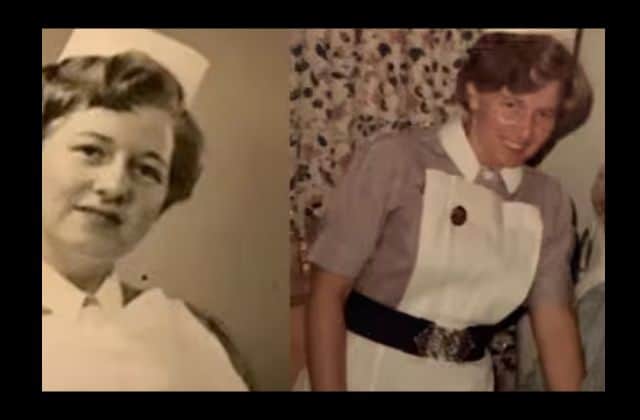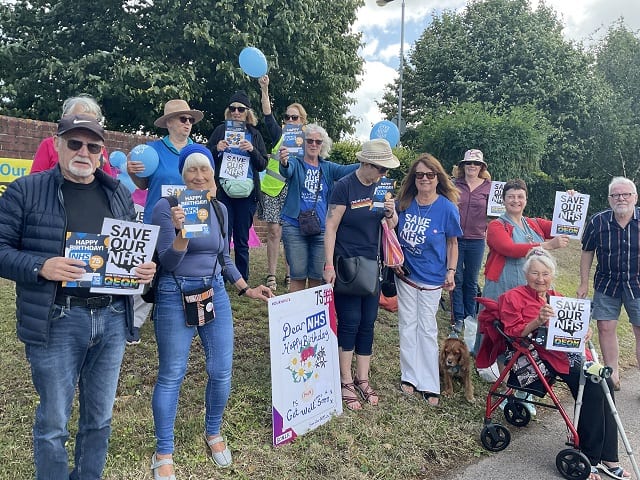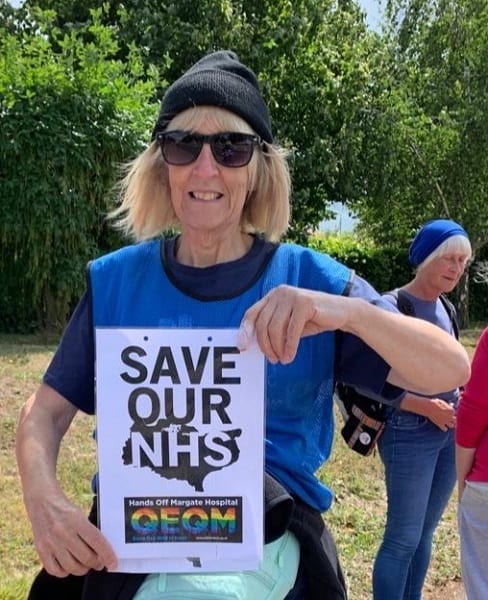
Feature by East Kent Hospitals
A health campaigner who spent decades caring for families in east Kent has revealed she almost chose catering as a career instead.
Peggy Pryer originally spent a year studying catering in sixth form, before deciding it seemed pointless spending hours creating dishes that would be demolished in just a few minutes.
Her headmistress suggested nursing would be a good career choice – but the now 85-year-old grandmother, from Bridge, initially disagreed.
Peggy said: “She said ‘I can see you as a nurse’; I said ‘I can’t!’.
“But in those days you did as you were told, certainly by your headmistress, so that’s how I ended up on the pre-nursing course at what was then Maidstone Technical School for Girls, now Invicta Grammar School.”
Peggy’s training as a State Registered Nurse started in 1955, just seven years after the NHS was formed. She spent three years as a student nurse at The Kent & Sussex Hospital in Tunbridge Wells before marrying her policeman husband and moving around Kent with him.
In 1961, when their first daughter Jayne was 10 months old, Peggy worked part time at the then Ramsgate War Memorial Hospital until a few weeks before having their second daughter, Beverly in 1963. When she was a few months old, Peggy became a district nurse for six months in Ramsgate, covering a friend’s maternity leave. After her third daughter Hilary was born in 1965 she returned to work part time on day duty at Ramsgate Hospital.
The family moved to Whitstable where Peggy continued district nursing and completed the National District Nursing Certificate. She covered Seasalter, Whitstable town, Swalecliffe and Chestfield in her Mini car, before moving to Herne Bay and working in the town centre, Herne, Greenhill, Beltinge and Reculver.
She said: “There were some very early morning visits, including going to diabetic patients’ homes to give them their pre-breakfast insulin.
“It wasn’t easy trying to reach the time target if there were more waiting for their injections. In those days patients were never allowed to self-administer insulin.
“We had no hoists then, so we were left trying to move bed-bound patients by ourselves, which was really quite dangerous. It is no wonder so many nurses of my generation have experienced bad backs.
“When hoists did come in, patients were frightened of them as were some of the nurses!”
After four years as a district nurse, Peggy went on to complete her midwife training at the Edith Greaves Maternity Unit, now part of the Queen Elizabeth The Mother Hospital in Margate.
She said: “One night soon after I had qualified I was allocated to the labour ward which meant I was in charge of the unit.
“We would have to line up outside the Senior Nursing Officer’s door each night to be told where we were working. I couldn’t argue with the SNO I just had to get on with it.
“Night duty in charge with minimal staff, only three of whom were qualified midwives, was really a baptism of fire!”
After finding midwifery increasingly hard to fit a round her husband’s shift work and family life, Peggy decided to train as a health visitor, meaning no more nights or weekend shifts.
When she qualified, she took on a caseload of more than 600 under fives in Canterbury, often working late to write up her notes from daytime visits. There were also occasional assessment visits to the elderly.
She trained as a steward of the Royal College of Nursing (RCN), the professional college and trade union for nurses, to campaign for improvements for their professional education, salaries and wellbeing.
In 1987 Peggy, then the local RCN lead steward, was involved in a car accident while on duty that led to her being medically retired in 1989. She became actively involved nationally with the RCN’s Work Injured Nurses’ Group (WING), supporting other nurses injured or who had become ill as a result of their work and received the RCN’s Award of Merit in 2002.
At one of the ‘Nurse of the Year’ presentation she received a cheque for WING and a huge bouquet of flowers from then Prime Minister John Major, and she also regularly met Secretaries of State for Health, pushing for them to recognise that work-injured nurses could still take on a variety of nursing roles.
In 1990 Peggy was elected to the Canterbury and Thanet Community Health Council and served on this for eight years. When plans were discussed to reconfigure healthcare in east Kent she began campaigning for the Kent and Canterbury Hospital to be maintained and upgraded.
The campaign evolved over the years and Peggy is still involved in the background, more than 22 years on.
She said: “It is always about educating the public and making sure people know the plans for healthcare locally.
“Being involved in the campaign really brought home to me how much people care about their local hospitals and the NHS.
“I may not be working now in the NHS but I’m still passionate about it. Members of my own family and friends work in both local and national healthcare and along with them, I want the NHS to be the best it can be for everyone as it was when I joined it as an 18-year-old student nurse way back in 1955.”
75 for 75
People working in health and social care in east Kent are being called on to celebrate the 75th birthday of the National Health Service by inspiring the next generation of workers
Healthcare professionals are being asked to donate 75 minutes of their time to become health and care ambassadors and encourage people to become doctors, nurses, therapists and care assistants, or find roles in finance, estates, project management, human resourcing or communications.
The plea comes shortly after the NHS Long Term Workforce plan was launched. The plan sets out an expansion in training, changes to ways of working, and improvements to culture that will increase the NHS permanent workforce over 15 years.
Munya Badze, Youth Volunteering Project Manager at NHS Kent and Medway, said: “We need to future-proof our NHS for the next 75 years by making sure we have the people to resource it. By volunteering to become a health and care ambassador, you can encourage young people starting out, or adults looking for a change of career, to find out more about the diverse number of roles available in the NHS and other care organisations.
“It’s not just about becoming a doctor, nurse or healthcare assistant – there are also a huge number of non-clinical jobs available. We’re looking for people from any organisation or profession in east Kent to take part, working with schools and colleges, or even at recruitment events, either online or in person.”
Ester Thomas, Matron at East Kent Hospitals University NHS Foundation Trust, who has recently become a health and care ambassador, added: “It’s vital that we inspire the next generation to become part of the health and social care sector. Nursing is one of the most dignified roles you can have, particularly if you’re looking after someone at the end of their life – sitting next to someone who’s dying is the most privileged position to be in.
“People will always require healthcare so it’s a job that can take you through your entire career. We know from the pandemic that people working in health and care will always be needed.”
For more information and to register to become a health care ambassador, visit www.kentcht.nhs.uk/ambassadors.
NHS campaigners

Kent health campaigners demonstrating outside Margate’s QEQM hospital have warned that the NHS is under threat.
At the demonstration, held to mark the 75th anniversary of the birth of the NHS, Candy Gregory of campaign body Save Our NHS in Kent (SONIK) said: “Recent comments by ex-Health Secretary Sajid Javid the NHS isn’t sustainable and is in need of an overhaul have given the game away.
“The political establishment has long wanted to abolish the idea of a public health service free at the point of delivery — and it looks like now they’re going to go for it.”

Candy who is a recently retired nurse added: “The public part of the NHS has already been badly eroded by a combination of creeping privatisation and gross underfunding. Now people like Javid are pushing the idea that charges should be made for visiting your GP, so the free at point of delivery is under attack, too.
“Healthcare professionals are leaving the NHS in droves for decent pay & conditions that they can find by moving to eg New Zealand, Australia, Dubai etc. Current Health Secretary refuses to offer any incentives to encourage staff retention. This leaves the NHS with @ 150,000 healthcare professional’s vacancies & has a profound impact on patient safety.
“People should be aware of this, should wake up to the fact that our NHS is facing the biggest threat in its history and be prepared to fight for it. If we don’t act now, soon it will be too late.
“The NHS is 75 and in its life has achieved many great things. Now’s the time to make it better and stronger — not kill it off!”

